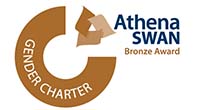Athena SWAN in the School of Sport and Exercise Sciences
Liverpool John Moores’ Sport and Exercise Science department is a proud holder of an Athena SWAN Bronze Award.

The School of Sport and Exercise Sciences EDI Panel was established in 2020, prior to which it was referred to as the Athena SWAN Self-Assessment Team. The Athena SWAN Charter provided an impetus, initial focus, and structure for our work, ensuring we utilise evidence to inform the development of clear actions, measures, and targets. However, following successful bronze accreditation in 2019, our Terms of Reference were updated to reflect our aspiration to establish a broader equity, diversity and inclusivity remit. To this end, the EDI Panel recognises that while Athena SWAN work is primarily considered through the lens of gender, other factors that shape people’s identity, and therefore their experience within the institution, should also be recognised, celebrated, and accounted for.
"The award of Athena SWAN Bronze is a significant achievement for our school and is testament to all of the hard work that the department has undertaken to advance equality, progression and success for all staff, students and colleagues that we work with."
Key issues and actions taken
- EDI Panel feature a regular slot (EDItorial) in the RISES newsletter, circulated to all SPS staff and students, to communicate ongoing activity.
- Personal tutor groups have been amended to ensure at least two women are together; this action was developed after feelings of isolation were identified in focus groups.
- SPS programme revalidation to embed EDI and decolonise the curricula.
- Encouragement of incorporating pronouns in staff email signatures.
- All job advertisements are processed through a gender decoding software to ensure neutral language and a diversity of statement is included
- All of SPS website and promotional materials underwent a thorough audit of imagery and language which resulted in considered and deliberate rebranding with a focus on diverse representation and neutral language
- Development of an inclusion calendar that displays key diversity dates and events celebrated nationally and world-wide.
The School of Sport and Exercise Sciences has formally pledged their commitment to the transformed principles of the Athena Swan Charter. In committing to the principles of the Athena Swan Charter, we recognise that we join a global community with a shared goal of addressing gender inequalities and embedding inclusive cultures.
We pledge to generate evidence to inform our own, specific gender equality challenges and develop our priorities accordingly.

